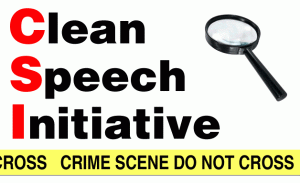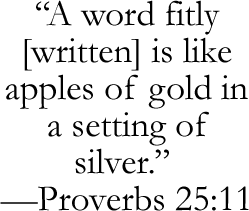In Defense of Clean Speech in Christian Fiction, Part 2
 See Part 1, Part 2, Part 3, Part 4, Part 5, Part 6, Part 7, and Part 8.
See Part 1, Part 2, Part 3, Part 4, Part 5, Part 6, Part 7, and Part 8.
The Relativism of Words
Some may read my heading and wonder, Huh? Relativism? I thought this guy was going to argue against bad language using absolutes. Yes, absolutes are certainly what drive my engine in this discussion, but I would be remiss not to acknowledge that words can be relative in certain contexts. So before I get to the meat, let’s get certain distractions out of the way.
First, what do I mean by “relativism in words”? When weighing the use of certain words, we must remember that their meaning and appropriateness can vary based on culture, time, and social context. Let me illustrate.
Context of Culture
My mom was born in Canada, and I remember my family visiting relatives in Ontario when I was a child. I recall being puzzled when a great-aunt (speaking with a strong English accent) referred to a sofa as a “chesterfield” and a napkin as a “serviette.”
When consuming British novels, American readers may come across a character using the word bloody in anger. We may not think twice about a word that many in Europe would consider to be profane.
Context of Time
The word gay used to mean “happily excited” or “bright” (still does, according to Webster’s), but since the 1950s (Dictionary of Word Origins), it generally means something altogether different.
The same is true of the King James Version’s alternative for the word donkey. Obviously, most Americans who use that word today aren’t referring to a four-footed animal. But certainly neither the God-inspired authors of our Bible nor the KJV translators (nor God Himself) intended to be offensive. (More on this in a future article.)
So when entering this topic, I want to be clear that I’m discussing what words mean in American culture. Today.
Context of Social Context
Relativism also enters the picture when we consider the appropriateness of certain words based on context. For example, when a pastor tells his son about the birds and the bees, he probably wouldn’t use vocabulary suitable for his closing prayer at the next worship service.
The appropriateness of word choice can also vary depending on whether words are sobbed during a counseling session or in a court room, or whispered behind closed doors and protected by patient confidentiality.
In this discussion, I plan to hone in, hopefully with laser-like precision, on words that appear in Christian fiction published in America today.
I’m talking about words that are indelible, theoretically fixed to paper until the end of time and at considerable cost (just ask publishers). It’s much easier to apologize for something carelessly muttered to a friend than to take back what someone has printed for millions to read (just ask anyone embroiled in a lawsuit for slander).
Where am I going with this?
Because of the indelible nature of the printed word, we must assume that those who write books, which are subject to the scrutiny of many editors and potentially countless readers, would approach the task with a certain degree of deliberateness, caution, and awareness of one’s audience and culture. Especially Christian authors.
Book writing is by its very nature premeditated and calculated. If words were knives and someone lay on the floor in a pool of blood, stabbed to death, the author could possibly (and quite probably) be guilty of first-degree murder.
Writing a book is no mere slip of the tongue. Words bring a certain level of responsibility, especially to the Christian author. Hence my CSI logo. Hence my premise that the use of unclean speech in Christian fiction should be a crime. This is a discussion we’ll explore in future installments.
What about you? Have you noticed how the meaning or appropriateness of words can vary based on time, location, or context? Do you mind sharing a few of your own examples?
- In Defense of Clean Speech in Christian Fiction, Part 1
- In Defense of Clean Speech in Christian Fiction, Part 3











Hm. I will say that growing up in the Bible belt gives you an innate feeling that certain words are “crude” that might not be considered crude elsewhere in the US. Growing up, I was not allowed to use the “c” word for manure…but in my hubby’s family, it’s okay (they run a dairy farm and see a LOT of said substance!).
I used to think “bloody” was such a cool word, till my husband explained that it’s completely vulgar to the British! Also, the word “mayhem” means more than we think, I believe.
Thanks for joining the discussion, Heather. Good thoughts here.
Pingback: In Defense of Clean Speech in Christian Fiction, Part 3 - |
Pingback: In Defense of Clean Speech in Christian Fiction, Part 5 - |
Pingback: In Defense of Clean Speech in Christian Fiction, Part 7 - |
Pingback: In Defense of Clean Speech in Christian Fiction, Part 1 |
Pingback: In Defense of Clean Speech in Christian Fiction, Part 4 - |
Pingback: In Defense of Clean Speech in Christian Fiction, Part 6 - |
Pingback: In Defense of Clean Speech in Christian Fiction, Part 9 - |